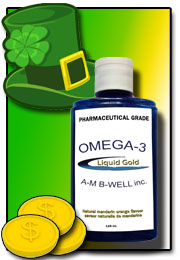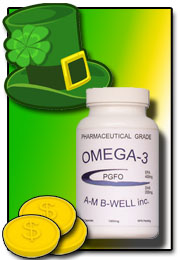


Greetings to all of My Customers, Case Club Members and Friends ...
Hello friends!
This year is off to another roaring start and the team at A-M B-Well - myself included! - are hoping that our Omega-3 fish oil has helped each and every one of you move closer to your health and wellness goals for 2012!
Please have a look at some more articles that we have selected reviewing the health benefits of supplementing your life with Omega-3 fish oil.
We are all proud to provide you with your own "pot of gold" at the end of the A-M B-Well rainbow.
Sincerely,
Anne-Marie
Low Levels of Omega-3 Fatty
Acids May Cause Memory Problems
source: http://www.aan.com
FEBRUARY 27, 2012
ST. PAUL, Minn. – A diet lacking in omega-3 fatty acids, nutrients commonly found in fish, may cause your brain to age faster and lose some of its memory and thinking abilities, according to a study published in the February 28, 2012, print issue of Neurology®, the medical journal of the American Academy of Neurology. Omega-3 fatty acids include the nutrients called docosahexaenoic acid (DHA) and eicosapentaenoic acid (EPA).
“People with lower blood levels of omega-3 fatty acids had lower brain volumes that were equivalent to about two years of structural brain aging,” said study author Zaldy S. Tan, MD, MPH, of the Easton Center for Alzheimer’s Disease Research and the Division of Geriatrics, University of California at Los Angeles.
For the study, 1,575 people with an average age of 67 and free of dementia underwent MRI brain scans. They were also given tests that measured mental function, body mass and the omega-3 fatty acid levels in their red blood cells.
The researchers found that people whose DHA levels were among the bottom 25 percent of the participants had lower brain volume compared to people who had higher DHA levels. Similarly, participants with levels of all omega-3 fatty acids in the bottom 25 percent also scored lower on tests of visual memory and executive function, such as problem solving and multi-tasking and abstract thinking.
The study was supported by the Framingham Heart Study’s National Heart, Lung, and Blood Institute and the National Institute on Aging.
To learn more about memory problems, visit http://www.aan.com/patients.
Click here to visit the A-M B-Well Inc. order page and get your PGFO today!!!


Pregnancy
and fish oils - How both mother and baby can benefit
source:
http://www.americanpregnancy.org
DECEMBER 2011
Scientific research is constantly expanding our knowledge of nutritional needs in pregnancy. Among the most recent developments in this field, is the importance of omega-3 fatty acids in both the development of a healthy baby and in the health of the mother.
What are Omega -3 Fatty Acids?
Omega-3s are a family of long-chain polyunsaturated fatty acids that are essential nutrients for health and development. Unfortunately, these are not synthesized by the human body and therefore must be obtained from diet or supplementation. However, the typical American diet is greatly lacking in Omega—3's.
Research indicates that the two most beneficial omega-3s are EPA (eicosapentaenoic acid) and DHA (docosahexaenoic acid). Although EPA and DHA naturally occur together and work together in the body, studies show that each fatty acid has unique benefits. EPA supports the heart, immune system, and inflammatory response. DHA supports the brain, eyes, and central nervous system which is why it is uniquely important for pregnant and lactating women.
Why is Omega-3 important?
Adequate intake of Omega 3 fats is essential to maintaining the balanced production of the hormone-like substances called prostaglandins. Prostaglandins help regulate many important physiological functions including blood pressure, blood clotting, nerve transmission, the inflammatory and allergic responses, the functions of the kidneys and gastrointestinal tract and the production of other hormones. Depending on the type of fatty acids in the diet, certain types of prostaglandins may be produced in large quantities, while others may not be produced at all. This prostaglandin imbalance can lead to disease.
The role of omega-3s in producing beneficial prostaglandins may explain why they have been shown to have so many health benefits, including the prevention of heart disease, improving cognitive function and the regulation of inflammation. High doses of omega-3s have been used to treat and prevent mood disorders and new studies are identifying their potential benefits for a wide range of conditions including cancer, inflammatory bowel disease and other autoimmune diseases such as lupus and rheumatoid arthritis.
Why is taking Omega-3 especially important during pregnancy?
Omega-3s have been found to be essential for both neurological and early visual development of the baby. However, the standard western diet is severely deficient in these critical nutrients. This omega-3 dietary deficiency is compounded by the fact that pregnant women become depleted in omega-3s, when the fetus uses omega-3s for its nervous system development. Omega-3s are also used after birth to make breast milk. With each subsequent pregnancy, mothers are further depleted. Research has confirmed that adding EPA and DHA to the diet of pregnant women has a positive effect on visual and cognitive development of the baby. Studies have also shown that higher consumption of omega-3s may reduce the risk of allergies in infants.
Omega-3 fatty acids have positive effects on the pregnancy itself. Increased intake of EPA and DHA has been shown to prevent pre-term labor and delivery, lower the risk of pre-eclampsia and may increase birth weight. Omega-3 deficiency also increases the mother's risk for depression. This may explain why postpartum mood disorders may become worse and begin earlier with subsequent pregnancies.
In a 2006 national survey, over two-thirds of pregnant women and new mothers said that they had not received any information from their health care providers about the benefits that Omega-3 could provide during their pregnancy and in the postpartum time.
What foods contain Omega-3 (EPA + DHA)?
The best sources of EPA and DHA are cold water fish such as salmon, tuna, sardines, anchovies, and herring. Many people are justifiably concerned about mercury and other toxins in fish, especially during pregnancy. For this reason, purified fish oil supplements are often the safest source of EPA and DHA. A high quality fish oil supplement from a reputable manufacturer delivers the health benefits of EPA and DHA without the risk of toxicity.
Many people think that flaxseed and/or flaxseed oil contains omega-3s. But flaxseed contains the shorter-chain omega-3, ALA (alpha-linolenic acid), which is different from the longer-chain EPA and DHA. EPA and DHA are the omega-3s that the body needs for optimal health and development. While it was once thought that the human body could convert ALA to EPA and DHA, current research shows that such conversion rarely and inefficiently occurs. Fish oil is a more reliable source of EPA and DHA.
Is it safe to take Fish Oil during pregnancy?
Quality fish oil is safe to take during pregnancy. Fresh fish (that is eaten) can often contain environmental toxins like mercury that accumulate during its life span. These toxins can be virtually eliminated during the manufacture and processing of fish oil, with the use of high quality raw materials and an advanced refining process.
Some brands of fish oil are of higher quality than others. A reputable fish oil manufacturer should be able to provide documentation of third-party lab results that show the purity levels of their fish oil, down to the particles per trillion level.
How much Fish Oil should be taken?
ISSFAL (the International Society for the Study of Fatty Acids and Lipids) has established the following recommended minimum dosage chart:
Infants (1-18 months):
0-15 lbs: 32 mg/lb EPA+DHA
Children (1.5-15 yrs):
15 mg/lb EPA+DHA
Adults (15-115 yrs):
500 mg EPA+DHA
(with a minimum of 220 mg EPA and 220 mg DHA)
Pregnant and Lactating Women:
300 mg DHA daily
Click here to visit the A-M B-Well Inc. order page and get your PGFO today!!!






5 ml. = 5 capsule
125 ml. / 4 ozs. per bottle
CLICK
HERE
to read label ingredients

90 capsules per bottle
CLICK
HERE
to read label ingredients







A-M B-Well™ Omega-3 PGFO has been third party tested according to the parameters established by the Council for Responsible Nutrition (“CRN”) and the World Health Organization (“WHO”) for its potency and purity by http://www.ifosprogram.com/ and receives a 5 Star rating.
Omega-3 PGFO capsules and Omega-3 Liquid Gold are identical in price, being $25.75 per bottle. Below is a chart listing the prices on the Order Page for Canada and U.S. Retail. The price shows the total price for 1 to 11 bottles with the freight included, then breaks it down by the price per bottle. 8 to 11 bottles are shipped freight-free.
The second chart called Case
Club Membership lists the prices on the Order Page for Canada and U.S.
Wholesale. This chart is to show you how much money you can save per bottle
if you order by the case (12 bottles) and also join the Case Club. You
will further note that the second chart also shows the total price for
bottles for 12, 24 and 36 bottles based on Regular and Case Club prices,
then breaks it down by the price per bottle. As you can see, you are paying
considerably less per bottle by ordering in bulk.







Case Club membership is
$25 per annum.
Club membership gives you a 5% discount on all
your case purchases for one year.
A good idea for customers purchasing 2 or more cases per year.
Visit
our Order Page and choose your Country.
You will be able to choose between Omega-3 PGFO Capsules and Omega-3 Liquid
Gold or order both together.
Warmest Regards,
Anne-Marie

